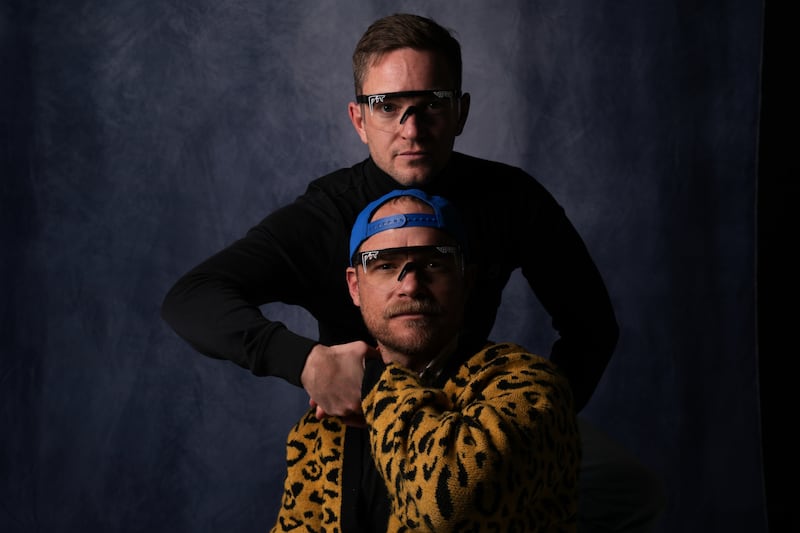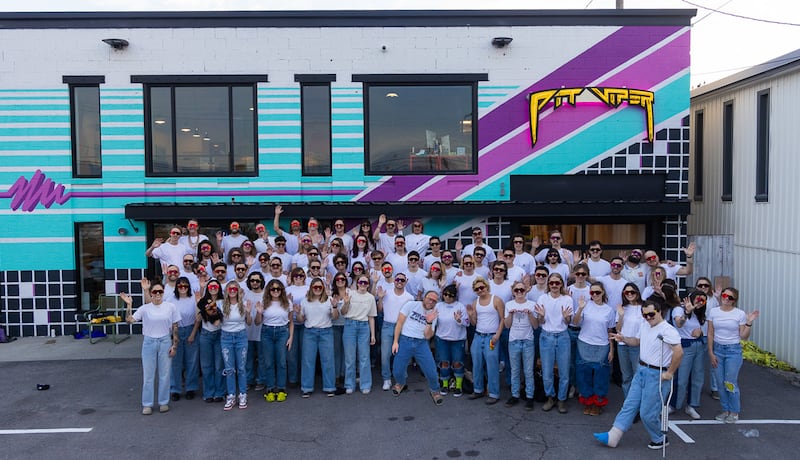Chuck Mumford graduated from the University of Colorado Boulder with a bachelor’s in environmental studies. While his classmates filled out job applications, he already knew what he would spend the next few years doing: skiing.
“I wasn’t going to get any better at skiing. I was going to get older and slower, so I decided I’d better do it now,” Mumford says.
Never interested in a formal career, Mumford readied his white, four-wheel drive Ford van, nicknamed Vana White, and seized all opportunities to ski professionally and recreationally. Between events, he often parked his van in Chris Garcin’s driveway. On those nights, the two former college classmates enjoyed dinner and dreamed of their futures.
“Outside of skiing, Chuck and I talked about business ideas and possibilities,” Garcin says. “We were both into this idea of trying to start [a business] to facilitate our desire to be more.”
From classmates to friends to business partners
While returning to Utah from a ski trip in Idaho, Mumford discovered one of those possibilities: a pair of military surplus ballistics sunglasses with a single-lens shield. He took to calling the shades “Pit Viper,” a skiing term Mumford commonly used at the time.
“We’d hit jumps and it would be like ‘pit viper style.’ We were a crew out there, always having fun and trying not to take anything too seriously,” he says.
Mumford liked the style so much that he soon returned to the same spot and bought 100 more pairs. He painted them all in loud neon pinks and greens and began trading the sunglasses for rides to ski resorts.
“[Buying those sunglasses] was fate. It was a product I needed and really liked,” he explains. “I liked the retro styling, and it fit my personality perfectly. As I continued using them, I realized they were something I couldn’t live without.”
When Garcin witnessed his friend’s passion for the product, he offered to join the venture and contribute his expertise.
“Chuck was in my garage one day, spray painting a handful of sunglasses, and I just said, ‘Dude, I know how to build a website. Let’s do this together,’” Garcin recalls. “[Chuck] said he’d been waiting for me to say just that.”
The two friends became partners in the new venture. Mumford had found the product they’d sell, and Garcin put his business school education into practice. Their first indicator of success came before Garcin even finished creating their website.
“I was in the middle of building on Shopify when a sale came through,” Garcin says. “We sold a pair, and I thought to myself, ‘Maybe we have something here.’” In 2012, Pit Viper began.
Out of the garage, all-in on the warehouse
The auspicious start led to the pair buying many, many more pairs of dead stock sunglasses from a military surplus wholesaler; approximately 10,000 additional pairs were bought, painted and sold.
“The warehouse was massive, like something out of a movie. When we first visited, its sheer scale completely blew us away,” Garcin says. “One day, the [warehouse owner] said, ‘OK, these are the last boxes. You guys bought us out.’” Garcin and Mumford quickly determined they only had about six months to go before they ran completely out of product.
Reaching the end of the military surplus supply meant Pit Viper needed to explore a new phase of growth. In 2014, the company stopped repurposing sunglasses and began manufacturing its own through the support of a successful Kickstarter campaign. Soon after, Garcin and Mumford locked down a warehouse space in South Salt Lake to be the base of operations and storage for product.
“It was go time. At the end of that month, I quit my job. A few months later, I sold my house. I went all-in on building Pit Viper,” Garcin says. “It’s a whirlwind how this has lined up and is happening, a combination of steady growth and moments of unbelief.”

As the new venture picked up steam, sales were modest. By the end of their Kickstarter campaign, however, with over $38,649 pledged from 508 backers and approximately $20,000 in sales on their site, it felt like the right time to commit fully.
“Over $50,000 in a month for sales was enough for me to decide Pit Viper could eventually support me,” Garcin says. “We hadn’t paid ourselves a dime up to that point, but I didn’t want the obligation of a mortgage looming over me as I took that risk. If all else failed, I knew I could just sleep on the couch at the Pit Viper warehouse.”
The personality approach
Thousands of years ago, Inuit tribes began cutting slits in walrus ivory to protect against snow blindness. In the 12th century, Chinese judges shielded their expressions with smoky quartz lenses. Today, C.W. Dixey & Son, founded in 1777, is the oldest eyewear company still in business.
When Garcin and Mumford came on the scene, they knew Pit Viper would have to differentiate to succeed in an industry with an ancient history. The company needed personalities who would love their product and help promote Pit Viper’s brand of not taking anything too seriously. The solution: find people who make people laugh — hard. The approach worked.
Larry Enticer, a mulleted and blue-jeaned Canadian snowmobiler who has racked up several million views online for his incredible jumps, quickly stood out as a candidate who already emulated the Pit Viper style. Garcin says it seemed “totally obvious” for him to wear Pit Vipers.
“As far as I know, he coined the term ‘just gonna send it.’ We saw his video and knew we had to send him a pair,” Garcin says. “Suddenly, he’s posting photos and videos and wearing Pit Viper sunglasses the whole time. He was all over the internet, and so were we. … Moments like that grew and built momentum for our brand.”
More notables include Rob Gronkowski, who played nine seasons with the New England Patriots; freeskier Tanner Hall; and Park City native Lauren Macuga.
Running on humor
The bigger Pit Viper grows, the stronger its resolve to make humor the forefront of its messaging. Recently, the company wrapped the Little Cottonwood Canyon Ski Bus, labeling it the official pace car of infamously bad traffic.
“Our goal was to create an ad interesting enough for people to turn around and immediately talk about it online,” Garcin says. “We managed to pull it off too. News of the wraps landed on the front page of the Salt Lake City Reddit.”

Garcin says a similar strategy was applied to their email marketing, the goal being a chuckle sponsored by the company. Instead of forcing new products daily on its subscribers, the company’s newsletters feature chain emails or very important alien conspiracy theories. Customers open them for guaranteed enjoyment more than the chance of a sale.
“We took an approach of entertaining people, of making our emails worth opening. If we’re sending one that doesn’t entertain you, it’s not worth sending,” Garcin says.
When Mumford travels to events and conferences, he similarly aims to make fun the focus, painting plastic briefcases filled with pairs of sunglasses and showing up in rollerblades and ’90s garb.
After facing many negative attitudes as part of the Freeskiing World Tour, Mumford spreads Pit Viper’s creed — take yourself a little less seriously — even if he has to rollerblade to make it happen.
“To be fortunate enough to be able to ski every day of your life is something too many people take for granted,” Mumford says.
Enjoying the ride
Over a decade in, Garcin confirms the company sells nearly 500,000 pairs of sunglasses annually. Pit Viper continues to connect with devotees while attracting wide-eyed newbies to the brand by creating a deeper catalog of products and connecting with new sports.
“Our company is in a space where we have to constantly reinvent ourselves, which is challenging and fun at the same time,” Garcin says. “We were fortunate to be ahead of the curve on a type of sunglasses that became incredibly trendy over the past few years. … Every eyewear company now has a version.”
To keep the lead, Pit Viper continues to strive for originality in its creations, constantly looking to “flip the script.” Garcin advises other entrepreneurs to do the same.
“I believe Pit Viper brings levity and lightheartedness to the activities we love,” Garcin says. “It’s a business — and there are hard days and difficult decisions — but I love running this company. I love Pit Viper and what it stands for: to exist as a reminder to take ourselves a little less seriously.”
